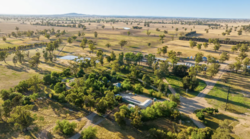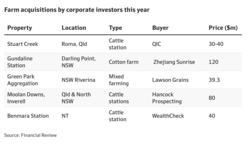
The Macneil family sold the Green Park aggregation to Lawson Grains, ending nearly 100 years of ownership.
Corporate buyers ramp up agricultural land spending as farmers retreat
by Larry Schlesinger
Institutional investors, large corporate players and big family operators are expected to dominate demand for prime farmland this financial year as smaller farmers’ buying power takes a hit from higher interest rates, lower profits and a more challenging seasonal outlook, say rural agents and valuers.
These emerging market dynamics mark a stark change from the period of record-low interest rates, when private farmers, unencumbered by the investment board deliberations of their corporate rivals, were able to act more nimbly to snap up opportunities when they hit the market.
The sale of Green Park represented a “strong result for arable mixed farming country in that area, superseding per hectare rates paid for much
In addition, whereas many large corporate portfolios have been broken and sold to individual farmers in the past few years, now the opposite is happening with institutional investors amalgamating properties and building new portfolios.
Driving all this investment is the global funds push into “natural capital” – the new catchphrase for sustainable farming and environmental asset classes.
Veteran rural agent Danny Thomas, a director at LAWD, said the “farmer-to-farmer” transaction space – properties typically priced up to $30 million – had become a “much tougher market” compared to two years ago when “10 groups were clambering to buy these assets”.
“This was when debt was cheaper and commodity prices were high, but both of those things have flipped 180 degrees virtually overnight,” Mr Thomas said.
“Debt particularly became much more expensive, much more quickly, than anyone anticipated and there has not been a lot of runway for people to adjust to that.”
Assets priced above $30 million, Mr Thomas said, were a different story.
This market remained “red-hot” due to pent-up demand from institutional investors.
“There’s also new money chasing natural capital solutions such as carbon, biodiversity and nature repair,” he said,
Recent acquisitions by institutional investors include Lawson Grains, the former Macquarie cropping giant (now owned by Canadian investment giant AIMCo and New Forests) purchasing the Green Park Aggregation at Rand in the NSW southern Riverina for more than $39 million from the Macneil family (who had owned it since the 1930s) and the Queensland Investment Corporation’s purchase of 8300ha Stuart’s Creek, near Roma in Queensland’s cattle country for more than $30 million from Packhorse Pastoral.
Rather than entering a downturn, Mr Thomas said the rural property market was “stratifying” into properties that corporates wanted and would pay a premium for and those where there was now less competition from local farmers.
“In the last month, we’ve sold more than $300 million of assets across even transactions, the largest being $85 million. Each asset was competed for by multiple parties and sold at record levels of value,” Mr Thomas said.
Andrew Garnsey, a valuer at Herron Todd White, pointed to sales such as Green Park and Gundaline Station, a massive irrigated cotton farm near Darlington Point bought by China-based textile manufacturer Zhejiang Sunrise Garment Group for $120 million in January as examples of the appetite of the corporate farming sector.
“The larger scale corporate segment of the market has seen increased activity in the past 12 months and several large transactions occurred in the first half of 2023,” he said.
The sale of Green Park represented a “strong result for arable mixed farming country in that area, superseding per hectare rates paid for much
smaller holdings in the past 12 months”.
“These sales and others across NSW confirm larger corporate and family-owned operators are looking for opportunities ... and are prepared to pay a premium for scale rather than attempt to organically expand operations over an extended period, particularly in tightly held areas,” he said.
It is not just on the mainland where local buyer appetite is waning and corporate buying power is on the rise.
In Tasmania, a similar stratification of the market is occurring, according to HTW valuer David Robertson.
He said real estate agents were reporting waning enthusiasm from local buyers as debt servicing increased and as retreating commodity prices for cattle, prime lambs and wool tightened cash flows and hit farmer confidence.
“Conversely, these same agents are noting the pendulum has swung in favour of corporate buyers who are still actively seeking scaled rural properties, especially blue-chip assets or properties with development upside,” Mr Robertson said.












